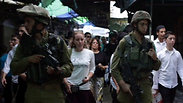
Israel is excavating an archaeological site in the flashpoint West Bank city of Hebron, officials said Thursday, in a move critics say aims to legitimize Jewish settlement in Palestinian territory.
The excavations began on January 5 during US Secretary of State John Kerry's 10th visit to the region to push Israel and the Palestinians towards an elusive peace deal.
Related stories:
- Terror persists, but West Bank fence still porous
- Jerusalem home harbors Temple artifacts
- Let settlers come home
The site is at Tel Rumeida, in the heart of Hebron's historic old city, a spokesperson for Israel's Antiquities Authority (IAA) told AFP.
"The Israel Antiquities Authority is implementing a salvage excavation... to develop an archaeological park in (Tel Rumeida) and prepare the ancient site for visits by the public," an IAA statement said.
"The excavation will be conducted in plots... which are owned by Jews. The total area to be excavated will be approximately six dunams (1.5 acres)," the statement said.
"The excavation will not disrupt the lives of the local (Palestinian) residents and will allow them to go about their daily routine," it added.
But critics have said the dig is a deliberate political move in a highly sensitive area, aimed at legitimizing Jewish settlement of the occupied West Bank.
"Any excavation in a politically-charged area is automatically a political move," archaeologist Yonathan Mizrachi told AFP.
"In Tel Rumeida, excavating the land is a very sophisticated way of legitimizing the takeover of land by settlers. By saying that they're carrying out an archaeological excavation, settler groups can say it's not a political act," he said.
"If settlers built homes on land that used to be owned by Palestinians, they would continue to be viewed by much of the Israeli public as a group of extremists. But through creating archaeological sites, settlers can bring in tourists, representing themselves as people who are protecting the place."
The flashpoint city of Hebron, home to nearly 200,000 Palestinians, also comprises some 80 settler homes in the centre of town housing about 700 Jews who live under Israeli army protection.
Mizrachi said the area was cultivated by Palestinians even after Israel occupied the West Bank in 1967, but that during the second Palestinian uprising in the early 2000s, they were barred from farming in the area.
The site is believed to house the tomb of the Jewish King David's father Yishai and great-grandmother Ruth.
The excavations began as Kerry was about to leave the region, having shuttled back and forth in four days of meetings between Israeli and Palestinian leaders, in an effort to push forward a faltering peace process.
Israel's occupation of the West Bank and the borders of a future Palestinian state is a key sticking point in the negotiations.















